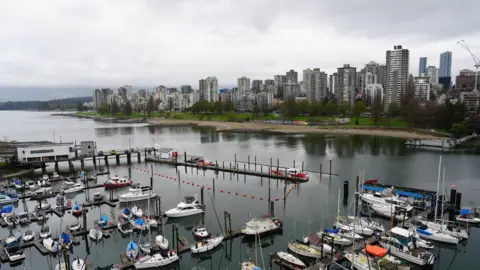BBC News
 Eloise Alanna/BBC
Eloise Alanna/BBCBefore Donald Trump imposed tariffs on Canada and threatened its sovereignty, the Canadian psyche was consumed with another major issue: housing affordability. With an election on the horizon, voters are wondering if any party has a plan to fix what has become a generational problem.
Willow Yamauchi says she was just a “regular” person when she and her husband bought their family home in Vancouver 25 years ago for a modest sum of C$275,000 – around C$435,000 ($312,000; £236,400) in today’s dollars.
That same property is now worth several million.
In the city in Canada’s pacific northwest, Ms Yamauchi’s story is as common as the rainy weather. The average price of a detached home in Vancouver in 2000 was around C$350,000. Now, it is more than C$2m.
“My husband and I were very privileged to be able to purchase a house when we did,” the 52-year-old writer tells the BBC. As a member of Generation X, timing was on her side.
The same, she says, cannot be said for younger people, who – without “the bank of mom and dad” – are effectively priced out of the city they grew up in.
Vancouver, a cultural and economic hub with a population of less than one million, is often seen as the epicentre of Canada’s housing crisis. A report by Chapman University in California last year listed it among the top “impossibly unaffordable” cities in the world.
But it is not the only Canadian city where the cost of homes is out of reach for many. Canada as a whole has one of the highest house-price-to-income ratios among developed nations.
In 2021, the average household income after taxes in Canada was around C$88,000, according to national data. That same year, the average home price hit C$713,500 – more than eight times higher. The gap is even larger in major cities like Toronto and Vancouver.
For many Canadians, housing is one of the top issues in the federal election, eclipsed only recently by US President Donald Trump and his tariffs on Canada. Before Trump, concerns on housing affordability had boosted the Conservative Party, which has consistently been seen as the best equipped to fix the crisis. Its success on pocketbook issues in general had threatened to collapse of the governing Liberal party, which only recently catapulted to the top of the polls in the wake of a trade war with the US.
Even with the Trump factor, the topic featured prominently in the two federal leaders debate this week. During the French debate, moderator and journalist Patrice Roy displayed figures showing how much home prices had increased in Montreal, Toronto and Vancouver in the last decade.
“I’m sure this won’t come as a surprise,” Mr Roy told the federal leaders, before asking for their plans on how they would fix the crisis.
 Eloise Alanna/BBC
Eloise Alanna/BBCPolls show young people are especially worried about the housing crisis and what it means for their future.
Speaking to students at the University of British Columbia’s (UBC) Vancouver campus, it quickly became clear that the issue was top of mind for many.
Many said they have either opted to live at home during their studies to save on costs, or are paying anywhere from C$1,100 to C$1,500 for a single room near campus, often in a home shared with five or six others.
Emily Chu, a 24-year-old who is in her final semester at UBC, says that she at one point had to delay her studies by two years in order to work, as she struggled to afford paying both tuition and rent.
She now shares an apartment with her older brother, who works full-time and pays the majority of the rent. Ms Chu considers herself one of the lucky ones.
As for home ownership in the future, she says “that’s not even possible” for most people her age. “Everybody kind of assumes that we can’t ever own housing.”
Young professionals with well-paying jobs, like Margareta Dovgal, are also priced out. The 28-year-old director at Vancouver-based non-profit Resource Works told the BBC that she has considered moving to the neighbouring province of Alberta due to its lower cost of living, despite being a lifelong and “committed Vancouverite”.
Still, Calgary, Alberta’s largest city, saw house prices increase by 15% in 2024 from the previous year as the city experienced its highest population growth rate since 2001.
The root causes of Canada’s housing affordability crisis are complex. One of the main issues is a supply that has not kept up with a growing population, which has driven up costs for both buyers and renters.
The Canada Mortgage and Housing Corporation (CMHC), the national housing agency, estimates that more than 3.8 million homes need to be built in the next six years to address the shortage.
Construction of new housing, however, has been well below that target, raising questions on whether Canada will meet this goal. Experts say barriers to ramping building include the high cost and scarcity of land in urban areas, where most Canadians tend to live and work.
There are also regional barriers, like city zoning laws that prevent the construction of more affordable, higher density housing – including apartment buildings or multiplexes – in some neighbourhoods.
Daniel Oleksiuk, co-founder of the advocacy group Abundant Housing Vancouver, says his city is one example, where more than half of the land has historically been zoned for single-family homes.
“We’ve kept almost all of the land reserved,” Mr Oleksiuk told the BBC. “There are whole neighbourhoods where all you have is three to five million dollar homes.”
 Eloise Alanna/BBC
Eloise Alanna/BBCOn the campaign trail, each major federal party has put forward a plan to fix the crisis, all with the goal of building as many homes as quickly as possible.
The Liberals, led by Mark Carney, said their aim is to build 500,000 new homes a year with the help of a new government agency called Build Canada Homes that would oversee and finance the construction of affordable housing in Canada – a plan similar to one implemented after the Second World War to house veterans.
Critics have questioned whether Carney’s target is viable, as it would require Canada to more than double its current construction rate.
Meanwhile, the Conservatives, led by Pierre Poilievre, vowed to tie federal funding to housing starts by rewarding cities that build more homes and penalising those that block construction – a carrot-and-stick approach.
Poilievre also promised to remove federal taxes on newly constructed homes in an effort to cut costs to would-be homebuyers. Critics, however, say this policy may have minimal effect, as most homes purchased in Canada are resold, rather than brand new.
Voters who spoke to the BBC say they welcome any plan to ramp up housing construction in Canada.
While much of housing is governed by provinces and cities, Ms Dovgal notes that the federal government has an ability “to lead persuasively” and implement measures that make it cheaper and easier to build across the country.
But others watching the issue closely caution that the steps proposed may not be enough.
Paul Kershaw, a public policy professor at UBC and founder of think tank Generation Squeeze, argues that politicians have failed to address the elephant in the room: the wealth older homeowners have generated off the housing crisis.
“The political bargain has asked younger Canadians to suffer higher rents and mortgages in order to protect those higher home values,” Kershaw notes.
“None of the parties are really naming that generational tension,” he says, adding that politicians may feel there is a political risk in trying to reverse or stall that wealth increase for older Canadians – or even saying it out loud.
Prof Kershaw calls this a “cultural problem”, and says that parties should also focus on reducing costs for younger people as a way to alleviate this generational burden.
Fixing the housing crisis, he argues, is just as integral as asserting sovereignty and prosperity in the face of threats posed by Trump’s tariffs.
The “dysfunction that has entered our housing market is disruptive to the well-being of the country”, he says.
Until a fix is found, the possibility of homeownership still looks bleak for many.
Ms Dovgal contends half-heartedly that, other than moving elsewhere, “you have to win the lottery, or marry a multi-millionaire. These are kind of the options”.









